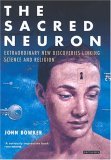Book review: The Sacred Neuron
 With a title like The Sacred Neuron, and the subtitle “Extraordinary new discoveries linking science and religion”, this book would seem to be of potentially crucial importance for our nascent field of neurotheology.
With a title like The Sacred Neuron, and the subtitle “Extraordinary new discoveries linking science and religion”, this book would seem to be of potentially crucial importance for our nascent field of neurotheology.
This book does indeed deserve a prize: for the most misleading packaging of the year. The brain is discussed on no more than half-a-dozen pages, and at that is just warmed-over basics from Ledoux, Damasio, and Rolls. Looking up “neuron”, the alleged subject of the book, in the index yields a mere five entries. Bowker’s knowledge of neuroscience could have been obtained from browsing this blog for about five minutes—basic stuff about dual pathways and the amygdala. There are no “extraordinary new discoveries” presented.
What the book does do is something some people might be interested in—to adopt a religious perspective in asking why humans form ethical and aesthetic judgments, or why they fight wars. Apprently, it began life as a lecture series given by the author at Oxford on the theme “The Appeal to History as an Integral Part of Christian Apologetic.” Gives you a flavor.
No doubt there is a much larger market for a book on neurons and religion than on English-style musings on ethics and values and history and religion. But that is no excuse for engaging in such gross mislabeling of a book. Shame on the publisher, who presumably suggested this, and the author, who must have agreed with it.

November 8th, 2009 at 03:25
If there are sacred neurons in the brain, that is the brains of believers, correspondingly, there must be profane neurons in the brains of atheists and neutral neurons in the brains of agnostics! Also, as there are people, who are believers now and atheists later and vice versa, there should be some mechanism which cause such transformations. Can the author or anyone explain?
D R Ananda Kumar